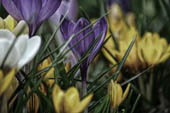
Purpose
To determine whether plants grow better when exposed to classical music or whether they grow better without being exposed to classical music, or if it doesn’t make a difference.
Additional information
Classical music has been proven to help both students and adults with their work. Students who listen to classical music often perform better on tests and adults listening to classical music are more productive. Can plants benefit from classical music as well?
Sponsored Links
Required materials
- 6 bean plants, sprouted
- 6 plastic cups
- Plastic plates
- 1 bag of potting soil
- Radio with CD player
- Classical music CD
- Journal or logbook
- Ruler
- Scissors
- 2-3 gallons of distilled water
Estimated Experiment Time
Several weeks.
Step-By-Step Procedure
- 1. Prepare the six bean plants (you may need to germinate the seeds if you do not have bean plants that are already sprouted) in the plastic cups with the potting soil. Poke small holes in the bottom of the cups and place them on the plastic plates for adequate drainage.
- 2. Place two plants in a room that is relatively quiet. Place the radio with the classical music CD in the room as well. These plants will be exposed to classical music for part of the day.
- 3. Place two plants in a room that is almost completely silent.
- 4. Place the last two plants in a room in the house that has normal, regular noise, such as your living room.
- 5. Each day, play classical music to the plants in Room 1 for an hour. Remember to water the plants every three days, or when the soil feels dry.
Note
You may need your parents’ help finding a classical music CD and preparing the cups for the soil (when using the scissors). Ask an adult if you need help with your project!
Observation
Each day, record how tall the plants are, as well as their overall color and lushness. Note the size of the leaves and anything else remarkable about each plant. Do this for several weeks.
Result
Chart the results on a graph. Which plants grew better? Was one set of plants taller than the others? Was one set greener? Did the plants in Room 3 benefit from a normal noise level, such as people talking and the television on? Use the graph to determine whether plants benefit from classical music, from silence or from neither.
Sponsored Links
Take a moment to visit our table of Periodic Elements page where you can get an in-depth view of all the elements,
complete with the industry first side-by-side element comparisons!